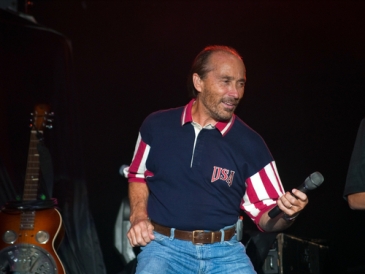The Post-9/11 Changing "Channel"
By Kim Bellware in Arts & Entertainment on Sep 9, 2011 9:05PM

Country music star and "God Bless the U.S.A." singer Lee Greenwood Andrew F. Kazmierski / Shutterstock.com
The question sparked a lively debate among Chicagoist staffers and made us think back on another question from ten years ago:
Two days after the September 11 attacks, can you listen to Kansas’ “Dust in the Wind?”
What about The Bangles’ “Walk Like An Egyptian?” Or The Ad Libs’ “The Boy From New York City”?
Ten years ago, these were questions nobody asked, but ones that radio conglomerate Clear Channel decided to answer with an internal memo circulated among its more than 1,000 stations. On September 13, 2001, company higher ups sent the message to its stations program managers which included an expanded list of songs containing "questionable lyrics” that stations should avoid playing.
Ryan Adam’s breakthrough hit, “New York, New York” became an unofficial anthem of post-9/11 optimism, while Frank Sinatra’s classic “New York, New York” was suspiciously absent from most Clear Channel airwaves--along with more than 150 other songs that the radio conglomerate had deemed inappropriate.
The week following 9/11, Jack Evans, then a regional senior VP of programming at Clear Channel, admitted to Slate’s political gossip column, Chatterbox, “I think there were certainly songs on the list that people were reading too much into. There were a substantial amount of songs in question that I'm glad the [program directors] brought up so we didn't air them at a very, very sad time."
Despite Evans’ de facto acknowledgement that the list excited, Clear Channel issued a statement the very next day saying it had not banned, per se, any songs from its stations, instead maintaining that the list was advisory and that stations could determine what was most suitable for their local audience.
While Clear Channel was quick to trample any rumors of banned music immediately after 9/11, the tune changed once the country declared war on Iraq. By 2003, artists like Kansas and Frank Sinatra were safely back in rotation, but some of Clear Channel's stations had new targets. In March of that year, the number one country group in the nation was in the crosshairs, with several Clear Channel stations banning The Dixie Chicks for anti-Bush comments made by lead singer Natalie Maines during a London performance.
On the other end of the spectrum, Toby Keith's "Courtesy of the Red, White and Blue (The Angry American)" enjoyed heavy rotation on Clear Channel stations despite some protests that it was overly jingoistic.
Clear Channel's preference for "patriotic" songs over pacifistic ones (Edwin Starr's "War" was among the post-9/11 "questionable tracks") or blatant anti-war ones (Dixie Chicks) felt anything but apolitical.
Since ethical standards guide photojournalism, difficult photos of carnage, death and chaos typically make the cut as long as they're factual. The best journalism shows all sides. Radio stations may not have the same obligations to the public as news outlets, but they nonetheless play a role in influencing and expressing what audiences are feeling. Ten years ago, there were strong voices about post-9/11 America on both ends of the spectrum; through Clear Channels outlets, some of those voices were muted.
Ten years later, can we listen to Clear Channel? If so, what do you want to hear?